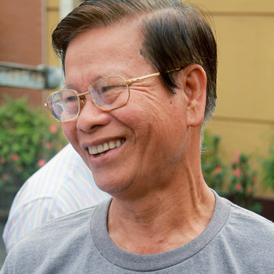Political prisoners freed in major Burma amnesty
As hundreds of political dissidents, politicians and journalists are freed in Burma, one analyst tells Channel 4 News the acid test for the country will be whether it allows free and fair elections.
Several high-profile political prisoners have been released in Burma, in the latest in a series of major amnesties.
Those freed include the leader of the failed 1988 pro-democracy uprising, Min Ko Naing. State television reported that 651 prisoners were released, but it is not clear how many of those were political dissidents. Former Prime Minister Khin Nyunt was also released from house arrest today, as well as several journalists.
Western powers have long been calling for political detainees to be freed, before they can consider lifting sanction on the regime. However, President Thein Sein’s arrival in office last year has seen a significant shift in direction, after decades of hardline military rule.

The move has been cautiously welcomed by pro-democracy leader Aung San Suu Kyi, who was released from 21 years of house arrest in November 2010. It was hailed as a “positive sign” by her opposition party.
This most recent release of political dissidents comes just a day after the Burmese government signed a landmark ceasefire with the ethnic Karen rebels. The group’s fight for more autonomy has been one of the most brutal civil wars that has blighted the country since it gained independence from Britain more than 60 years ago.
More from Channel 4 News: Hague and Aung San Suu Kyi call for Burma changes
Only last week, the Foreign Secretary William Hague visited the country. Today, he said the release of political prisoners was “exactly the kind of measure” he had called for, as was the “much-needed ceasefire in the conflict with the Karen people.”
“I am delighted to hear that a significant number of political prisoners in Burma have today been released, including 88 Generation and ethnic leaders,” he said.
“The release of all political prisoners is a long-standing demand of the international community and I warmly welcome these releases as a further demonstration of the Burmese government’s commitment to reform.
“I hope these positive steps will contribute to greater democratic participation in the upcoming parliamentary by-elections.”
Late last year, the US Secretary of State Hillary Clinton delivered a similar message, during her visit to Burma. “There has to be a momentum behind reform and we’re waiting and watching for that,” Ms Clinton said in December 2011.
Fair elections
Dr Gareth Price, Senior Research Fellow at Chatham House, told Channel 4 News that this is the latest in a series of positive steps by Burma. He said the country is keen to demonstrate to the international community that it is progressing. However, he said it is yet to be seen whether Burma will “tick that other box of fair and free elections”.
“What happens if Aung San Suu Kyi stands in the next elections and gets 99 per cent of the vote, but the elections aren’t free and fair, so she doesn’t get elected?” Dr Price asked.
He added that the reason Burma is taking these progressive steps now could be because they want to appease the masses. “They have seen people overthrow their authoritarian governments in the Arab Spring, and the Burmese government could potentially be worried”, he said.
-
Latest news
-
Taylor Swift’s new break-up album breaks records3m

-
NHS trust fined £200K for failings that led to death of two mental health patients3m

-
Sunak vows to end UK ‘sick note culture’ with benefit reform3m

-
‘Loose talk about using nuclear weapons is irresponsible and unacceptable’, says head of UN’s nuclear watchdog3m

-
‘There wasn’t an Israeli attack on Iran,’ says former adviser to Iran’s nuclear negotiations team7m

-




